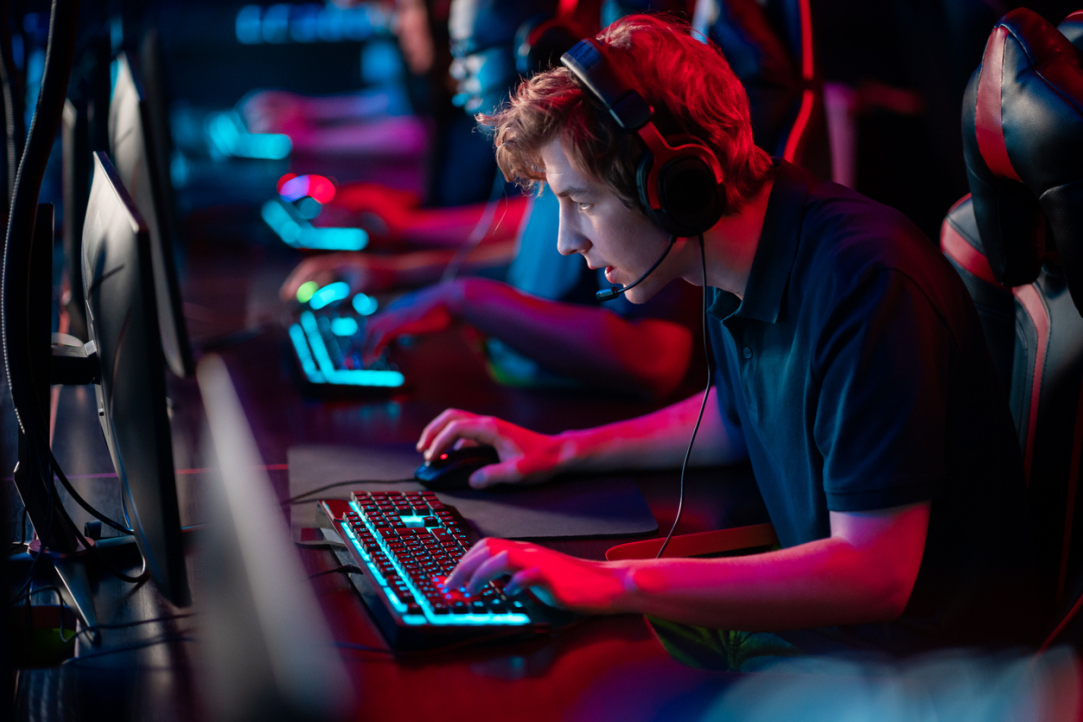Esports Players Play Better Online

In competitions, esports players, like other athletes, face stress and show worse results due to pressure. A substantial decrease takes place in the performance of esports players during overtime. This effect, however, is significantly mitigated in online competitions compared to live events—the difference can reach 30%. A study by a team of authors from HSE University’s Moscow and Perm campuses and European University Viadrina (Germany) explores the phenomenon of choking under pressure within the context of esports. The study was published in the Journal of Economic Behavior & Organization.
Esports is a multibillion-dollar industry with major tournaments and million-dollar prizes. In addition, in Russia, esports has become a priority area of development. As in traditional sports, both technical skills and psychological stability are key to success. Understanding how stress affects the performance of players will help to improve the training process and achieve better results.

Gleb Vasiliev
Gleb Vasiliev, Junior Research Fellow at the Laboratory of Sports Studies of the Faculty of Economic Sciences, Petr Parshakov and Iuliia Naidenova, staff members of the International Laboratory of Intangible-driven Economy at HSE University in Perm, and Igor Tylkin, researcher at European University Viadrina, studied the behaviour of esports players in the game Counter-Strike: Global Offensive (CS:GO).

Petr Parshakov
CS:GO is a competitive online shooter in which two teams of five players compete. Matches are usually played on 1–5 maps, which in turn consist of short rounds. To win the round, teams must either complete a specific task or eliminate their opponents. Usually, 30 rounds are played on one map in competitions. When a team wins at least 16 of them, it wins the map. In the event of a draw, additional rounds are played: at 15:15, overtime starts. The team of scientists analysed players’ behaviour in overtime.

Iuliia Naidenova
The authors studied statistics from almost a million games for the period from 2012 to 2022 among players with both high and low ratings. The sample included more than 1,700 esports players. The researchers used two key indicators.
The first was individual performance, which included the player’s rating (calculated by comparing a player's average performance statistics to the same averages for CS:GO in general calculated over a period of time) and the percentage of accurate shots. These metrics reflect the level of skill in difficult conditions. The second is team coordination, ie cases of ‘friendly fire’ (causing damage to teammates). An increase in the number of hits on teammates may indicate tension and problems with communication in the team. Pressure and stress were measured by analysing overtimes—additional rounds that are played to determine the winner in the event of an equal outcome in matches. As in traditional sports, in extra time, the result of the game most often depends on numerous small factors. In addition, the authors studied the impact of the game format: whether it was an on-site performance or an online tournament. Approximately 70% of the matches were played online, and overtimes were played in 9% of them.
It turned out that overtimes do cause players significant stress. On average, they lead to a decrease in player ratings by almost 2%, and the percentage of accurate shots decreased by 7%. This decline was evident in both professional and novice players. ‘The results of our study show that although experienced players outperform their less experienced counterparts in all game formats, this advantage may fade away in overtime,’ noted the authors. The probability of errors leading to friendly fire also increased.
The tournament format plays an important role. When competitions are held online, with no audience or unnecessary excitement, players perform about 30% better than during on-site matches. Researchers attribute this to a psychological factor—the presence of fans increases stress.
The researchers note that the results of the study can be applied in various fields. For example, it is worth considering that the format of work (on-site or online) significantly influences stress levels and their impact on team coordination and individual results. ‘Esports is a good platform for testing such effects. Players’ high cognitive activity and team coordination are essential in the game, which makes it a convenient object for analysing behaviour under pressure. The study results can be useful for HR departments and crisis management, as well as in fields where teamwork and productivity under pressure are important, such as IT consulting or startups,’ the authors added.
See also:
Using Two Cryptocurrencies Enhances Volatility Forecasting
Researchers from the HSE Faculty of Economic Sciences have found that Bitcoin price volatility can be effectively predicted using Ethereum, the second-most popular cryptocurrency. Incorporating Ethereum into a predictive model reduces the forecast error to 23%, outperforming neural networks and other complex algorithms. The article has been published in Applied Econometrics.
Administrative Staff Are Crucial to University Efficiency—But Only in Teaching-Oriented Institutions
An international team of researchers, including scholars from HSE University, has analysed how the number of non-academic staff affects a university’s performance. The study found that the outcome depends on the institution’s profile: in research universities, the share of administrative and support staff has no effect on efficiency, whereas in teaching-oriented universities, there is a positive correlation. The findings have been published in Applied Economics.
Physicists at HSE University Reveal How Vortices Behave in Two-Dimensional Turbulence
Researchers from the Landau Institute for Theoretical Physics of the Russian Academy of Sciences and the HSE University's Faculty of Physics have discovered how external forces affect the behaviour of turbulent flows. The scientists showed that even a small external torque can stabilise the system and extend the lifetime of large vortices. These findings may improve the accuracy of models of atmospheric and oceanic circulation. The paper has been published in Physics of Fluids.
Solvent Instead of Toxic Reagents: Chemists Develop Environmentally Friendly Method for Synthesising Aniline Derivatives
An international team of researchers, including chemists from HSE University and the A.N. Nesmeyanov Institute of Organoelement Compounds of the Russian Academy of Sciences (INEOS RAS), has developed a new method for synthesising aniline derivatives—compounds widely used in the production of medicines, dyes, and electronic materials. Instead of relying on toxic and expensive reagents, they proposed using tetrahydrofuran, which can be derived from renewable raw materials. The reaction was carried out in the presence of readily available cobalt salts and syngas. This approach reduces hazardous waste and simplifies the production process, making it more environmentally friendly. The study has been published in ChemSusChem.
How Colour Affects Pricing: Why Art Collectors Pay More for Blue
Economists from HSE University, St Petersburg State University, and the University of Florida have found which colours in abstract paintings increase their market value. An analysis of thousands of canvases sold at auctions revealed that buyers place a higher value on blue and favour bright, saturated palettes, while showing less appreciation for traditional colour schemes. The article has been published in Information Systems Frontiers.
New Method for Describing Graphene Simplifies Analysis of Nanomaterials
An international team, including scientists from HSE University, has proposed a new mathematical method to analyse the structure of graphene. The scientists demonstrated that the characteristics of a graphene lattice can be represented using a three-step random walk model of a particle. This approach allows the lattice to be described more quickly and without cumbersome calculations. The study has been published in Journal of Physics A: Mathematical and Theoretical.
Scientists Have Modelled Supercapacitor Operation at Molecular and Ionic Level
HSE scientists used supercomputer simulations to study the behaviour of ions and water molecules inside the nanopores of a supercapacitor. The results showed that even a very small amount of water alters the charge distribution inside the nanopores and influences the device’s energy storage capacity. This approach makes it possible to predict how supercapacitors behave under different electrolyte compositions and humidity conditions. The paper has been published in Electrochimica Acta. The study was supported by a grant from the Russian Science Foundation (RSF).
Designing an Accurate Reading Skills Test: Why Parallel Texts are Important in Dyslexia Diagnosis
Researchers from the HSE Centre for Language and Brain have developed a tool for accurately assessing reading skills in adults with reading impairments. It can be used, for instance, before and after sessions with a language therapist. The tool includes two texts that differ in content but are equal in complexity: participants were observed to read them at the same speed, make a similar number of errors, and understand the content to the same degree. Such parallel texts will enable more accurate diagnosis of dyslexia and better monitoring of the effectiveness of interventions aimed at addressing it. The paper has been published in Educational Studies.
Internal Clock: How Heart Rate and Emotions Shape Our Perception of Time
Our perception of time depends on heart rate—this is the conclusion reached by neuroscientists at HSE University. In their experiment, volunteers watched short videos designed to evoke specific emotions and estimated each video's duration, while researchers recorded their heart activity using ECG. The study found that the slower a participant's heart rate, the shorter they perceived the video to be—especially when watching unpleasant content. The study has been published in Frontiers in Psychology.
Scientists Identify Personality Traits That Help Schoolchildren Succeed Academically
Economists from HSE University and the Southern Federal University have found that personality traits such as conscientiousness and open-mindedness help schoolchildren improve their academic performance. The study, conducted across seven countries, was the first large-scale international analysis of the impact of character traits on the academic achievement of 10 and 15-year-olds. The findings have been published in the International Journal of Educational Research.


